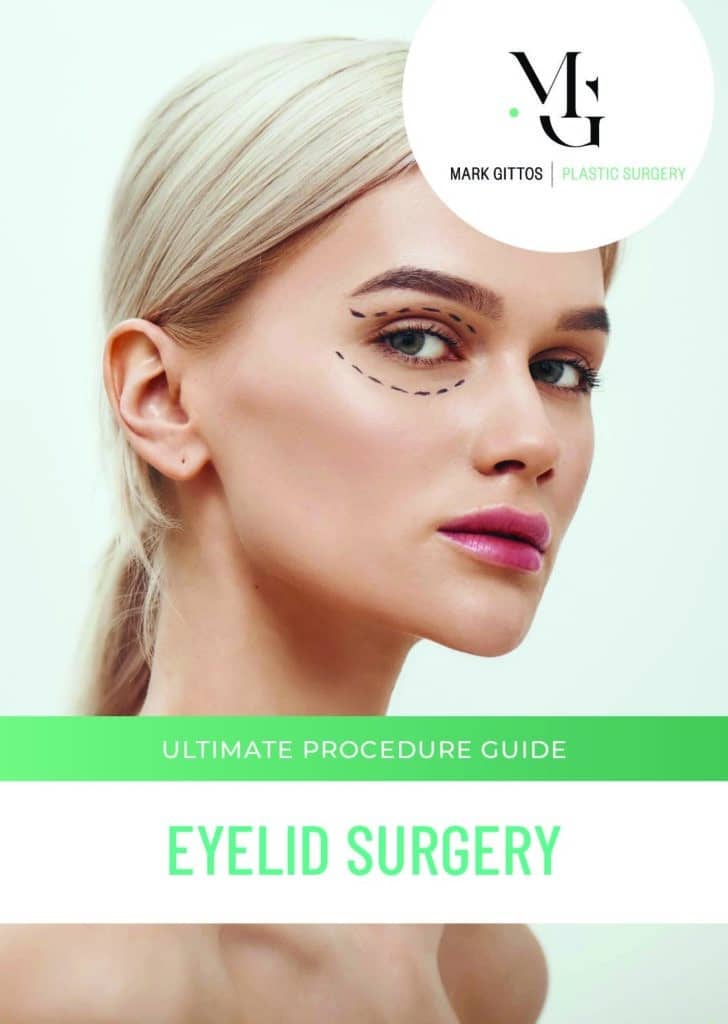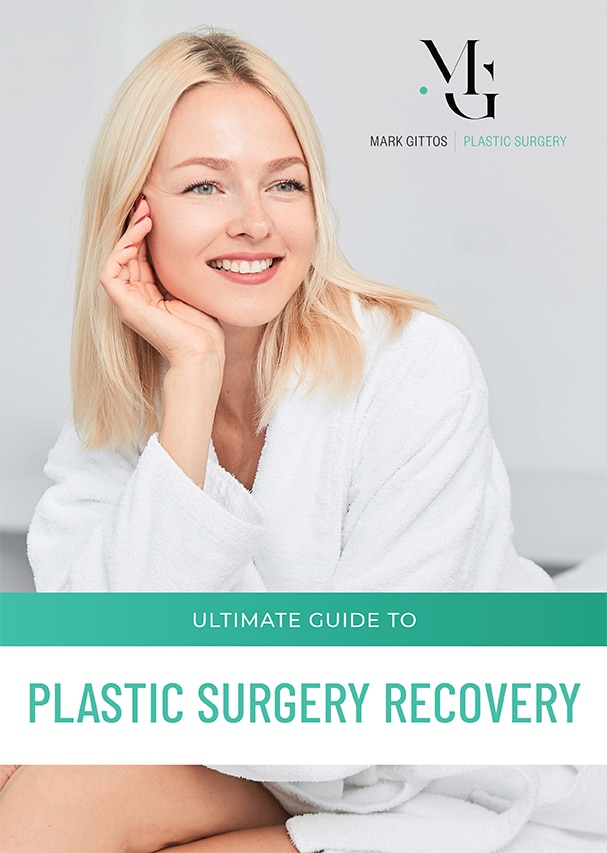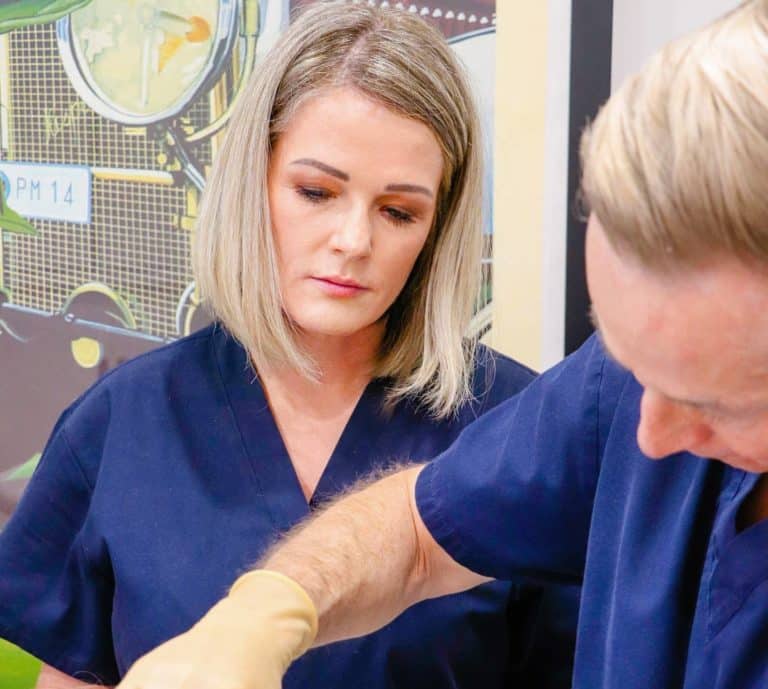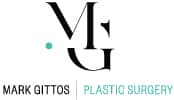How to have a better Recovery after Eyelid Surgery?
Eyelid surgery or Blepharoplasty and can improve the appearance of your eyes by getting rid of excess skin, muscle, and fat. The eyelid lift surgery can help you look years younger by getting rid of droopy eyelids or and bags underneath your eyes. You can look more youthful, less tired and more alert & refreshed.
Dr Mark Gittos is an eyelid lift expert and Plastic Surgeon in New Zealand dedicated to helping his patients achieve the best results possible with the help of surgical and non-surgical procedures.
Download Dr Mark Gittos’ Guide to Eyelid Lift Surgery – Blepharoplasty

Common Types of Eyelid Surgery
Here are the main types of eyelid procedures:
- Upper Eyelid Surgery: this is recommended for people who have sagging skin, excess fat, and extreme puffiness on their upper eyelids
- Lower Eyelid Surgery: this type of surgery benefits people who struggle with excess skin and bags underneath their eyes
- Upper & Lower Eyelid Surgery: the intervention is performed to simultaneously improve the appearance of your upper and lower eyelid and rejuvenate the aspect of the face
- Asian Blepharoplasty – to create double eyelids
Eyelid Surgery Recovery – What to Expect
After your eyelid surgery, you will have tiny incisions in your eyelid that require proper care. You will probably feel tight and sore around the eye area for a few days. Apart from that, your eyes might become watery, dry, sticky, itchy or more sensitive. Don’t worry, as it is normal and part of the recovery process. Your vision may also be blurry for a couple of days, combined with some slight pain or discomfort. Dr Gittos will prescribe medication to help you deal with the discomfort.
It is critical to keep your eyes and eyelid clean and sterile at all times. Do NOT rub them. Follow all the instructions given by Dr Gittos when it comes to cleaning and caring for your eyes. You might experience bruising and swelling for about two weeks after the surgery. Your stitches dissolve on their own in a matter of 3 to 5 days post-surgery.
Most of the bruising will fade away in about two weeks’ time. The overall appearance of your eyes will gradually become better over the course of three months. Most people can return back to their work in a matter of 10 to 14 days after eyelid surgery. You might need to use some eye drops to keep them moist during the recovery phase. It makes the healing process more comfortable.
What Influences Your Recovery after Blepharoplasty
It is important to understand that the recovery period varies for different people. While there are certain similar aspects, it can still be considerably different based on the following factors:
- Age
- Overall health and fitness condition
- Quality and elasticity of your skin
- Your body’s tendency to bruise
- Overall pain tolerance
- How committed you are to following post-op instructions
- Type of eyelid surgery; upper or lower Blepharoplasty
- Whether you have had additional procedures done at the time of surgery or not
Download Dr Mark Gittos’ Guide to Plastic Surgery Recovery

Tips for Eyelid Surgery Recovery
Choosing a top plastic surgeon for your eyelid surgery is only half the effort. The other half lies in how well you take care of yourself post-surgery. We have prepared some tips that will help you:
Activities during recovery
Follow these tips to help have a smoother recovery:
- Have plenty of rest and sleep. Adequate rest and sleep will help you recover faster
- Sleep with your head slightly elevated. Keep 2 or 3 pillows stacked under your head while sleeping
- Do not start driving again without consulting Dr Gittos first
- Avoid reading, watching television or using your phone for the first two weeks after the surgery. It can cause excessive strain on your eyes
- Do not wear lenses for two weeks or until Dr Gittos allows it
- Avoid using face cream and lotion as they can irritate your eyes and eyelids
- Take special care while washing your face or showering, and make sure that hair products don’t get in your eyes
- Do not rub your eyes for at least a week post-surgery
- Avoid bending over and lifting heavy weights for two weeks after the treatment
- Avoid swimming, hot tubs, or saunas
- Avoid strenuous exercises for two weeks to a month after the surgery
- Wear sunglasses for at least three months after the surgery while going out
Medication to Take During Recovery Period

- Never skip or alter your medications without consulting Dr Gittos first. If you want to have a smooth, pain-free recovery, take your medications on time
- Avoid taking any blood-thinning medications without consulting with Dr Gittos, as it can lead to bruising
- Follow Dr Gittos’ instructions when it comes to using eye drops and antibiotic ointments
Incision Care
- If your eyes are covered with a bandage, keep it on for as long as the surgeon recommends
- Keep the treatment site clean and dry at all times. Keeping the area overly moist can lead to infections
- Use a cold pack on your eye to reduce swelling. Do not overdo it. Make sure to wrap the ice in a towel
- Always go for our follow-up appointments to ensure everything is fine
When to Call Your Surgeon After Eyelid Lift Surgery
Here is a list of few instances in which you need to contact your surgeon or emergency dept immediately:
- You lose consciousness at any time post-surgery
- You are finding it difficult to breathe
- You are experiencing chest pain and coughing up blood
- Your pain is getting unbearable despite taking painkillers prescribed by your surgeon
- Your stitches are becoming loose
- You experience bleeding from the treatment site
- You experience increased pain, swelling, bruising, and warmth
- You notice an infection on the treatment site
- You get a fever
- You notice redness and swelling in your leg and groin area
- You are noticing changes in your vision
- You are not getting better over time as expected

Recovery Timeline Post Blepharoplasty Surgery
It is easier to go through the recovery period when you know what to expect. Here is what your recovery period will look like post-surgery.
24 Hours after the Surgery
- Once your anaesthesia wears off, you will be allowed to return to your home. Most likely, your eyes will be covered with a bandage and light gauze. So, you need someone to drive you home after the surgery. Make sure you have arranged this in advance
- Avoid any physical activity for the first 24 hours post-surgery. Bed rest is best and keep your head elevated. Try staying still while laying down. Your eyelids will feel swollen and tight as soon as the anaesthesia wears off. This condition is most prominent during the first three days after surgery
- Use eye drops/ointments as prescribed by your surgeon. Take your pain killers on time if you wish to have a smooth pain free recovery
- Use a cold pack to help reduce swelling. Avoid applying ice directly to your eyes as it can cause an ice burn. Always wrap it in a towel and do it for five to ten minutes at a time. Don’t overdo it
1-2 Weeks after the Surgery
- You will still have puffiness and swelling around your eyes. It usually subsides within a period of two weeks
- The incisions around the eyes will be pinkish-red in colour
- Your eyelids will be numb for several days. It is fairly normal after any kind of plastic surgery
- Your eyes will be extremely sensitive to light. Hence, cutting down on your screen time is essential
- Your eyes might be watery or dry. It varies from person to person
- Some patients may have a black eye appearance due to bruising. Ensure that you are not taking any blood-thinning medications as they can worsen the appearance
- Elevating your head while sleeping, drinking loads of water, rest, a healthy diet, sun protection, time administration of medications and care will help you recover faster
2 Weeks Post Surgery
- You will be able to return back to work two weeks after the surgery. The two week’s break gives you plenty of time to rest and recover
- Avoid straining your eyes excessively for at least a month post-surgery; reading, watching TV/Phone can strain your eyes
- Most patients can resume light activity two weeks post-surgery. It includes light walking, doing house chores comfortably. Always double-check with your surgeon prior to resuming your extensive exercise routine
- After 3 to 4 weeks, your surgeon will allow you to wear light makeup. It is still recommended to avoid waterproof mascaras and heavy glitter shadows
- Do wear sunglasses to protect your eyes against sunlight and wind
- As you heal fully, you will start to appear younger, refreshed and rejuvenated

Eyelid Surgery Recovery FAQs- Questions about Blepharoplasty Surgery Recovery
How long does it take to recover from blepharoplasty eyelid surgery?
- You can return back to work two weeks after the eyelid surgery. However, your eyes will continue to heal and improve over a three month period. Please note that the initial recovery period can vary for different patients.
What is the fastest way to recover from a blepharoplasty?
- Here are a few tips that will help you recover faster from a blepharoplasty:
- Use an ice pack to reduce swelling and discomfort
- Take all the medications prescribed by your doctor on time
- Use eye drops regularly
- Take lots of rest as it helps speed up the recovery phase
- Wear sunscreen and use sunglasses to protect your eyes
How long do eyelids stay red after Blepharoplasty?
- It is common to experience redness and swelling after Blepharoplasty. It will take around two weeks to diminish.
What can I expect after blepharoplasty surgery?
- Bruising and swelling are very common after Blepharoplasty. You may also have some redness around the eyes with increased sensitivity.
Can I sleep on my side after eyelid surgery?
- No, you cannot sleep on your side. Sleep on your back with your head alleviated. Stacking a couple of pillows under your head helps.
When can I wash my hair after Blepharoplasty?
- Patients can typically wash their hair five days after Blepharoplasty. Avoid getting the shampoo in your eyes.
How long does bruising last after Blepharoplasty?
- Most of the bruising will be gone in a matter of two weeks after Blepharoplasty. However, in some cases, it can take about 3 to 4 weeks after the surgery.
How soon can I wear makeup after Blepharoplasty?
- You need to wait for several weeks before wearing eye makeup. For the first two weeks, avoid wearing it entirely. Make sure to confirm with your surgeon before wearing makeup.
Can you watch TV after eyelid surgery?
- Dr Gittos suggests avoid watching TV for a few weeks after the surgery.
How long do stitches stay in for Blepharoplasty?
- Sutures will dissolve within 5-7 days after the surgery.
What can I put on my scars after eyelid surgery?
- It is advised to use a topical silicone-based scar cream to reduce scars after the surgery once your eyelids are fully healed. Read more about Using Silicone Strips to reduce your cosmetic surgery scars.
How do you treat scars after eyelid surgery?
- Here are a few ways to reduce scars. First, let them heal properly. Second, massage the scars gently. Once the scars have softened, apply a topical silicone-based scar cream to minimise the appearance of scars.
How do you wash your face after Blepharoplasty?
- Start by cleaning your eyelids with the help of a cotton tip applicator and hydrogen peroxide for the first day after surgery. After three days, you can wash your eyelids with the help of gentle soap and pat dry. Avoid rubbing your eyes. Be gentle with your face till you are fully healed.
Further Reading about Blepharoplasty with Dr Gittos
- Male Eyelid Surgery NZ
- Male Eyelid Lift FAQs – Questions about Blepharoplasty for Men
- Five Biggest Mistakes Surgeons make with Eyelid Surgery
- Lower Blepharoplasty Recovery Day by Day
Medical References about Recovery after Eyelid Surgery
- Blepharoplasty (Eyelid Surgery) page on WebMD site
- Sagging Eyelids More Common in These People?
- Blepharoplasty: An Overview
- Blepharoplasty page on Mayo Clinic site
About Dr Mark Gittos FRACS (Plast) – New Zealand Plastic Surgeon
Practice locations in Herne Bay Auckland, Northland and Bay of Plenty – Kerikeri, Whangarei, New Plymouth & Tauranga
Dr Mark Gittos is a leading Specialist Plastic Surgeon and operates a practice in Herne Bay, Auckland and in the UK. The practice focuses on both surgical and non-surgical procedures, each designed to help restore, improve or change a physical characteristic or problem. The first step in every case is to talk through your personal requirements and explore all the options, before deciding on the most effective solution.
Dr Mark Gittos offers high quality, natural-looking cosmetic surgery results and is highly experienced in Breast, Body and Face Surgery having performed over 4000 Surgeries in the last 26 years. With worldwide expertise Dr Gittos is an expert in breast, face and body surgery for men & women.
Naturally, before any treatment is begun, we will explain clearly the advantages and risk factors; so that you have the information you need to make an informed decision that is best for you. Visit the practice to find out more.

NEXT STEPS
Please NOTE: Dr Gittos only performs surgery on non-smoker patients with a BMI less than 30. To check your BMI please visit the NZ Heart Foundation website. For help giving up smoking before surgery visit the Smoke Free website
Do your Research
- Read the Website and Blogs relevant to your procedure
- Browse our Frequently Asked Questions including how to choose a Surgeon for your procedure
- Download and read the FREE Guides to Surgery
What to Bring to your Plastic Surgeon Consultation
- Bring a friend or relative to help discuss the information and your choices
- Take lots of notes and read the documents provided thoroughly
- Dress in simple clothes as you may need to undress for examination
- Bring your medical referral and any relevant medical documents or test results
Book your Initial Surgery Consultation
- A Referral from your GP or specialist is helpful but NOT essential – you can have a consultation without a GP Referral
- Email us or Call on 09 529 5352 to arrange your surgeon consultation appointment.
- Book a consultation with Dr Gittos by paying the Consultation Fee – $350 incl GST
Traveling for Surgery? – Consider post-surgery luxury recovery in a Hotel with LuxeCare
Please contact us to arrange to book a consultation with our Specialist Plastic Surgeon or to speak with our Patient Care Advisor.
Send an enquiry form today or phone 09 529 5352 during Clinic Hours
